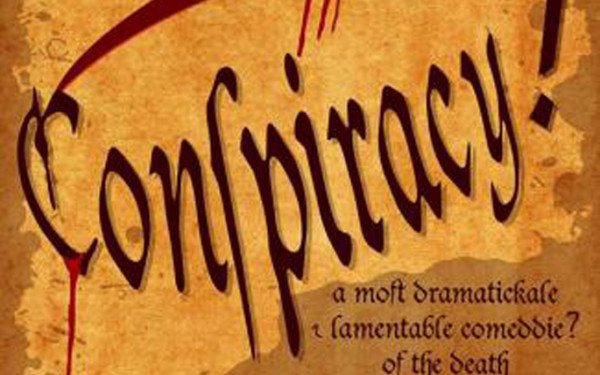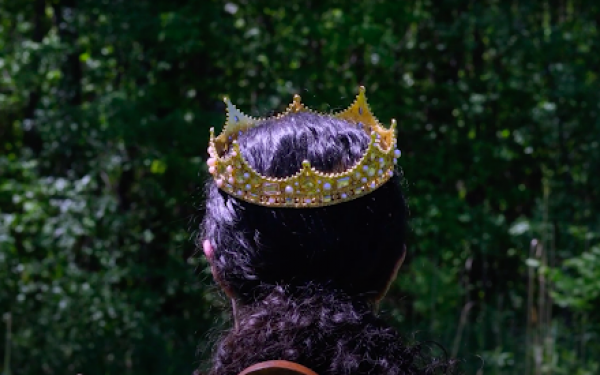Macbeth on Your Macbook
Shakespeare Comes to Life in Montreal Group’s Podcast
Imagine what it might have been like to sit around a table in the 16th century reading Macbeth with friends.
Flagons of ale at the ready, candles flickering as wax gathers in pools on the table. A friend cries, “Out, damned spot!” and clutches at an invisible dagger in the air in a rendition of Lady Macbeth’s famous speech.
That’s what the men behind the Bard Brawl are trying to recreate. Well, maybe with bottles of beer instead of flagons. And, you know, electricity.
Almost every Tuesday since 2009, Daniel J. Rowe and Eric Jean—who met in a Shakespeare class during their undergrad at Concordia—have met and read an act from one of the Bard’s plays aloud.
By word of mouth, what began as a partnership expanded. The BB has accumulated over 15 members to date, though on any given week Rowe said there are usually somewhere between four and six people reading together. Most of the “brawlers” are either current Concordia students or alumni.
Jean and Rowe’s main goal with the project is to make Shakespeare accessible to anyone.
“It’s not just for Shakespeare nerds, because everyone who reads it likes it,” Rowe said. “Once you get into it, you get hooked.”
Rowe and Jean are always accepting new members, but it’s a low-pressure environment.
“There’s no commitment, you don’t have to come and promise to be there every Tuesday for the rest of your life—although you should,” Jean joked.
Based on Jean’s first exposure to Shakespeare, it’s hard to believe he’s writing his Masters thesis on the Bard.
“In Grade 10, my English teacher gave me a D on my paper on Macbeth, and I vowed to show him,” Jean said, laughing. Shortly thereafter, Jean sought out a Shakespeare anthology and began reading. He hasn’t stopped since.
Both Rowe and Jean said that over time they’ve managed to memorize a fair bit of Shakespearean verse.
“I’ve read so much of it now that entire sections of plays sort of get stuck in my brain and lines spontaneously come out,” Jean said, and when prompted, he recited an impressive Marc Antony speech from Julius Caesar.
The brawlers have gotten through nearly 20 plays to date, including some of Jean and Rowe’s favorites: Julius Caesar, King Lear and Troilus and Cressida. They recently finished recording Henry VI, Part 1, and are now reading Timon of Athens.
Despite the dusty-tome nature of the material, the group has kicked into high gear recently thanks to relatively recent technology.
This past summer, the BB started a blog and a biweekly podcast. Each podcast is comprised of the reading of one act of a play, plus a bonus sonnet.
The blog includes film critiques of Shakespearean adaptations, such as the 1996 film Looking for Richard, which Rowe was particularly inspired by.
In the film, Al Pacino goes through Richard III and attempts to make sense of what can sometimes be seen as a convoluted play. With the help of historians and theatre experts, Pacino makes the play more accessible to a modern audience.
It’s an ideal that Rowe holds dear to his heart.
“[Shakespeare’s] meant to be taken, and dissected, and looked at and read. It’s supposed to be fun,” said Rowe.
Rowe’s wife and fellow brawler, Stephanie Coleman, does the artwork for the posters and website, and the group meets in the couple’s apartment in the Gay Village. Coleman emphasized the laid-back nature of the BB.
“We always ask questions and stop. We try to be inclusive. There’s no snobbery,” she said.
But the group has room to grow. Coleman is donating 10 per cent of the proceeds from her painting sales at her next art show to the BB, and Rowe has set up a “donate” button on their website. The group’s first goal is to purchase better sound equipment; right now, they record everything on an iPhone.
Rowe and Jean also hope to be able to pay the people who lend their voices to the podcast in the future. That way, they could spend five or six hours recording an entire play instead of coordinating five separate meetings. This would allow the voice actors to get to know their characters better, as well.
“It’s good for people, especially those who haven’t had much exposure to the work, to see where their character goes,” Rowe said.
Jean has also come up with the idea of pitching their vision to high school students as a way of giving young people a comfortable foray into what can be a daunting subject.
“If kids get to read it together without someone like a teacher there to tell them they’re doing it wrong, they’ll get it. They’ll work with each other,” Jean said.
But no matter the setting or equipment, Rowe said, “It’s just, at a very rudimentary level, exploring language, stories, themes and characters and appreciating it without making any grandiose statements about what it means. We laugh our way through it.”
Check out the Bard Brawl blog online and find the podcast by searching for “The Bard Brawl” under Podcasts in the iTunes Store.

_900_672_90.jpg)
_600_832_s.png)

_600_375_90_s_c1.jpg)


